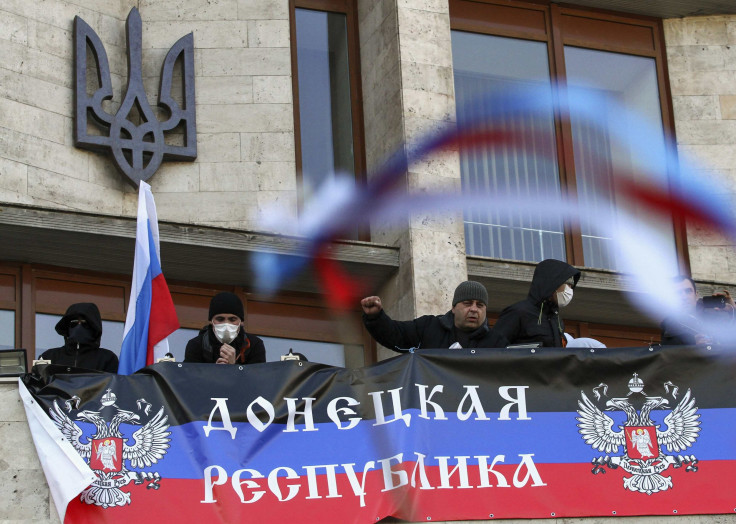White House: Eastern Ukrainian Protesters May Have Been Paid By Russia

One day after a group of pro-Russian protesters seized buildings in several Eastern Ukraine cities, White House officials are speculating that the protesters are being paid by the Russian government to sow instability in Ukraine.
On Sunday, separatist protesters seized government buildings in the Ukrainian cities of Donetsk, Kharkiv and Luhansk, calling for the same referendum to join Russia that was held in Crimea last month. In Donetsk, the hometown of exiled former Ukrainian president Viktor Yanukovich, protesters occupied the chamber of the regional assembly, dubbing it the Republican People’s Soviet of Donetsk and flying Russian flags.
The White House responded to the protests on Monday, alleging that the Russian government may be paying the protesters to create dissent in Ukraine and pave the way for an invasion of Eastern Ukraine.
“As you know, we saw groups of pro-Russian demonstrators take over government buildings in the eastern cities of Kharkiv, Donetsk and Luhansk, and there is strong evidence suggesting some of these demonstrators were paid and were not local residents,” White House Press Secretary Jay Carney said at a Monday press briefing.
“If Russia moves into eastern Ukraine either overtly or covertly, this would be a very serious escalation. We call on President Putin and his government to cease efforts to destabilize Ukraine.”
Carney specifically shied away from saying that the protesters were paid by Moscow, instead clarifying by saying he believes “outside forces” paid the demonstrators, but the implications are clear.
Secretary of State John Kerry has also denounced Russia’s possible involvement with the Donetsk protests, asking his Russian counterpart Sergei Lavrov to "publicly disavow the activities of separatists, saboteurs and provocateurs.”
Ukrainian Prime Minister Arseniy Yatsenyuk shares the White House’s concerns about Russian involvement, noting in an interview that protesters in Donetsk, Kharkiv and Luhansk had “distinct Russian accents,” NBC reported.
"The plan is to destabilize the situation, the plan is for foreign troops to cross the border and seize the country's territory, which we will not allow," Yatsenyuk said.
The Russian government has denied allegations that protesters in Donetsk were funded by Moscow. In an official statement delivered Monday, the Russian Foreign Ministry criticized the Ukrainian government’s hold over its own people. The statement calls on Ukraine to federalize its government:
Russia is carefully observing the events in the eastern and southern regions of Ukraine, in particular in the Donetsk, Lugansk, and Kharkiv regions.
As the Russian government has repeatedly noted, without real Constitutional reform in Ukraine, in the framework of which through federalization, the interests of all regions of the country would be guaranteed, preserving its extra-bloc status, strengthening the special role of the Russian language, it is hard to expect long-term stabilization of the Ukrainian state.
If an irresponsible attitude to the fate of the country, to the fate of its own people on the part of political forces that call themselves the Ukrainian government continues, then Ukraine will inevitably encounter ever new difficulties and crises.
It’s time to stop nodding to Russia and blaming it for all of the problems of today’s Ukraine. The Ukrainian people want to hear from Kiev a coherent answer to all questions.
It is time to heed these lawful demands.
Russia confirms its proposals for international assistance to the beginning of an authentic national dialogue of all political and regional forces in Ukraine. We are prepared to take part in the relevant efforts together with foreign partners, including the ministers of foreign affairs of countries that attested to the 21 February agreement on the settlement of the crisis in Ukraine.
Watch Carney’s statements about Russia below.
© Copyright IBTimes 2024. All rights reserved.












